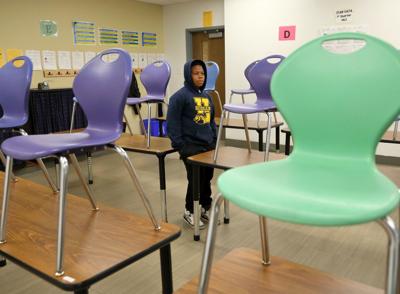COLUMBIA, Mo. — Nearly all Missouri school districts have closed or are planning to close as a precaution against the spread of the new coronavirus, but Gov. Mike Parson as of Wednesday had not issued a blanket order closing schools.
The governor said during a news conference in Columbia, Missouri, Tuesday that local officials were best suited to make decisions on whether to close.
“All of them are very diverse. All of them are drastically different,” Parson said of the state’s school districts. “It’s much different — whether it be here in the Columbia school systems or whether you’re in Hayti in the Bootheel — a lot of schools do not have day care capabilities. They have no place for kids to go.”
“Parents are working,” Parson said. “We felt like the local levels, elected officials there, would know best how to do their schools.”
People are also reading…
On Wednesday, Auditor Nicole Galloway, a Democrat running for governor against Parson, a Republican, urged him to show “clear leadership” and said a “patchwork” of rules would “cause more confusion and do more harm.”
Other states — such as Kansas and Illinois — have ordered all schools to close their doors. On Friday, Illinois Gov. J.B. Pritzker, a Democrat, announced schools would be closed through March 30. In Kansas, Gov. Laura Kelly, a Democrat, closed through the rest of the academic year.
Ohio Gov. Mike DeWine, a Republican, to close by the end of school Monday through April 3. But he has said schools could be closed for the rest of the school year.
“The reality of this pandemic is that it cannot be controlled statewide if school buildings return to normal operations or if they respond inconsistently within our local communities,” Kelly said Tuesday, according to the Wichita Eagle. “Unprecedented circumstances threaten the safety of our students and the professionals who work with them every day.”
Public school districts across Missouri are making those decisions on their own. As of Wednesday afternoon, , at least 538 districts and charter schools out of 555 statewide had closed or had plans to close for at least three weeks.
Also Wednesday, districts in Wright City and Warrenton in Warren County became the first in the ӣ����Ƶ region to announce closures for the remainder of the school year.
The extended closures have raised concerns about state school funding, which is based on a district’s average daily attendance. Also at issue is the standardized testing that takes place each spring.
The U.S. Department of Education has indicated it could waive state requirements to assess students this spring. At least 16 states, but not Illinois or Missouri, have applied for waivers to cancel or postpone the standardized tests.
Mallory McGowin, spokeswoman for the Missouri Department of Elementary and Secondary Education, said the state won’t penalize districts that decided to close because of the coronavirus. Under state rules, attendance counts can be taken from a previous year, given the extenuating circumstances.
“The department has made that clear from the get-go that this is a local decision and that we are working with them to provide every flexibility we can … to continue to ensure their current and future funding,” she said.
ACT and SAT college entrance exams have already been canceled through May. Advanced Placement, or AP, exams taken in May for college credit, could change to a take-home format, according to test administrator the College Board.
Most school districts around ӣ����Ƶ have set up breakfast and lunch delivery or pickup services for students during the break.
Galloway said it was only a matter of time before all of the state’s schools temporarily shut down.
“It’s clear that all schools are going to have to close,” Galloway said in a statement. “Governors facing these same difficult decisions are taking decisive action quickly in consultation with health experts. Parents, teachers, and administrators are looking for guidance and clarity on the plan to handle childcare and nutrition.”
All ӣ����Ƶ-area school districts were either closed or had plans to close as of Wednesday afternoon, according to .
Blythe Bernhard of the Post-Dispatch contributed to this report.














